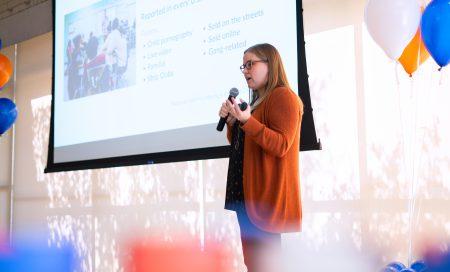By Armando Gomez/reporter

Sexual abuse, exploitation awareness illuminated by Fort Worth-based nonprofit Unbound
Human trafficking happens in front of our very eyes, the Fort Worth Unbound director of community outreach Larinda Smith told NW students and staff Feb. 26.
She told the audience how to recognize human trafficking, know how traffickers recruit and identify vulnerabilities.
“Bruises, scars, tattoos and involvement in the sex industry are red flags.”
“Traffickers trap their victims in a romantic situation or in a marriage proposal,” she said. “Beware of modeling ads, that is one way human traffickers try to trap their victims.”
In sex trafficking, the victim is forced to perform sexual acts in exchange for something, Smith said.
A study conducted in 2016 from University of Texas School of Social Work revealed 313,000 victims in Texas and an additional 79,000 minors and youth.
“Human trafficking is becoming a huge criminal industry and is a serious issue in Texas,” Smith said. “If you are out shopping, watch out for sweet-talking, they will try to tell you that you are pretty.”
The Texas Triangle, composed of Interstate highways connecting San Antonio, Houston and Dallas-Fort Worth, provides an easy way for traffickers to move people about.
Smith said the average age of children targeted for sex trafficking in Texas was 15.
“Middle school age is easy to manipulate,” she said. “Common ways to attract children include live video, strip clubs, gang-related activities or online sales.”
Smith told the audience human traffickers recruit the victims at malls, schools, internet and social media.
Recruiters would look for victims when they are unsupervised and manipulate victims.
She said that anyone can be a victim, and similarly, human traffickers can be anyone.
Smith said people need to watch out for computer apps like concealment apps that are ostensibly created for privacy to hide photos or chatting apps that send messages without phone numbers.
Connection apps are dangerous because they allow you to share your own location, and it is easier for human traffickers to find your exact location, Smith said.
She told the audience how to look for signs of a victim.
“Bruises, scars, tattoos and involvement in the sex industry are red flags,” she said. “A student skipping school, dating someone older or being disruptive in class are signs that a child could be a victim of child sex trafficking.”
Smith said that a pimp usually forces a victim to get a tattoo to show possession of the victim.
“The tattoo could be a money bag, barcode or a pimp street name,” she said. “The number one tattoo symbol on victims is a crown.”
Smith said the hard part about understanding human trafficking is victims do not want to identify themselves or leave.
“Most victims will not self identify because of fear of being put in foster care or fear of getting family in trouble,” she said. “Traffickers use lies, fear and threats to make victims feel they are worthless.”
The department planned the event because of an increase in cases in the city, said NW health services administrative assistant Diane Alvarado.
“Fort Worth police are investigating a growing number of human trafficking cases in the city,” Alvarado said.
NW student Janet Jackson said the most important lesson she learned was identifying the signs and symptoms of human trafficking.
“Human trafficking has occurred two blocks from the street where I live in my neighborhood in Keller,” she said.
Smith said she hoped students learned how important safety is since college students are more likely to be at risk than any other group.
“It really begins with healthy relationships and from there, they can learn how to be safe online,” she said.

